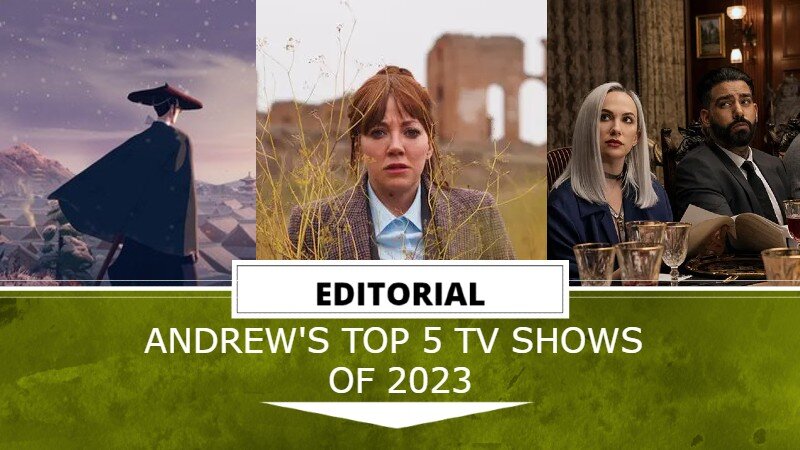Putting 2023 in the Rearview Mirror
Time flies! And putting together my top 5 TV shows of 2023, it feels like the year went by especially quickly. Of course, this is subjective, but I wonder if it has to do with having so many great TV shows come out and not enough time to watch them all. Even though we had a major writer’s strike that only resolved relatively recently, 2023 saw a wealth of television arrive. Even with some shows I didn’t have time to get to, I still watched a whole bunch that I really loved. Case in point, as much as I enjoyed Black Mirror, Good Omens, and The Last of Us this year, I found other shows I appreciated even more. So here are my top 5 favorite shows of 2023, and I hope you find some you enjoy too.
Cunk on Earth
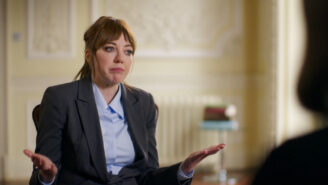
I’ve been a fan of Philomena Cunk, the persona of Diane Morgan, for a while. I’d often watch clips of the quirky British interviewer on YouTube or see her one-off specials, like Cunk on Shakespeare. So an entire show of hers debuting on Netflix came as a pleasant surprise. While Cunk on Earth does retread some familiar ground in its retelling of the “entire history of the world,” it still has some big laughs. Morgan’s deadpan delivers adds extra humor to the clever lines by writers including Charlie Brooker (who also created the show, and Black Mirror). But the best moments come from Morgan playing off of her interview subjects. In one segment, the naïve Cunk learns about the existence of nuclear weapons from a subject, and becomes inconsolable until the two bond over a mutual love of ABBA. The show blends satire, parody, and documentary into something that’s laughable, relatable, and–sometimes–educational.
Mrs. Davis
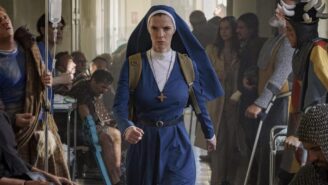
Mrs. Davis feels like a Neil Gaiman novel adapted by Hideo Kojima. A nun takes on a quest to find the Holy Grail in order to destroy a sentient AI that has taken over the world. The Peacock limited series commits to its bonkers premise. But at the same time, Betty Gilpin as Sister Simone grounds the show with a heartfelt performance, along with the rest of the earnest cast. Mrs. Davis can have a rodeo star stage a jailbreak with the Pope one moment, and a nun question the depths of her faith the next. And most importantly, it makes these tonal shifts work. Perhaps unsurprisingly, the creatives behind it come from just as varied backgrounds, with writing from both Damon Lindelof of Lost and Jonny “Jomny” Sun of Everyone’s a Aliebn When Ur a Aliebn Too. Mrs. Davis works as an exploration of technology and faith, but also as a riotous good time.
Blue Eye Samurai
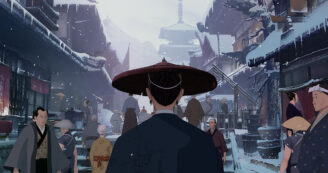
Netflix has really stepped up its animated lineup game. And I wouldn’t be surprised if Blue Eye Samurai becomes the flagship for its animated programming going forward. Husband and wife team Michael Green and Amber Noizumi created and wrote this series about Mizu, a mixed-race warrior on a quest for revenge in Edo Japan. The nuanced characters, especially Mizi, come off as complex and layered as the show peels back their pasts and throws dilemmas their way as the story progresses. Fittingly, the visuals are also layered, blending both 2D and 3D animation. This creates a dazzling effect, with battles feeling especially kinetic yet precise. The voice actors commits so well to their characters that I’d forget I was listening to George Takei, Brenda Song, Kenneth Branagh, and other well-known performers. But Maya Erskine and Masi Oka prove particularly memorable as the austere Mizu and her affable apprentice Ringo, an odd-couple pairing that gives the show an extra layer of contrast.
Poker Face
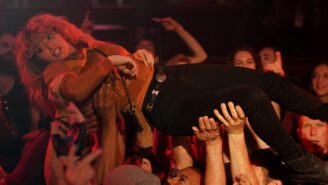
With Knives Out and Glass Onion, Rian Johnson has given us two of the best whodunits of the 21st century. So as a “case-of-the-week” style series, Peacock’s Poker Face provides a treasure trove of murder mysteries. Natasha Lyonne stars as Charlie Cale, a Columbo-like casino worker with the uncanny ability to detect a lie. As she goes on the run from a mob boss, she encounters various crimes in her cross-country trip through America. Plausibility aside, this allows each episode to focus on a unique setting and tone, from a humorous sendup of community theater to a nail-biting setup at a snowed-in cabin.
Each murder unfolds at the start of an episode, so the mystery falls to how Charlie Cale will catch a lie and tie it to the corresponding crime. The whole time, she’s trying to lie low from the mob, so she has to find increasingly creative ways to bring the perps to justice. Lyonne’s Charlie is so likeable and quirky, it’s a treat to see her engage with people from all walks of life. At its worst, Poker Face proves entertaining as television. But at its best, certain episodes could have easily passed as shortened versions of Knives Out film sequels.
The Fall of the House of Usher
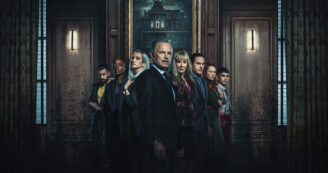
The Fall of the House of Usher continues a three-year trend of a Mike Flanagan limited series appearing on this list. At this point, I’d consider Flanagan a master of horror. And while Netflix’s House of Usher falls just short of Flanagan’s first streaming hit, The Haunting of Hill House, it still offers peak horror television. Why? The Fall of the House of Usher could have just adapted its namesake novella by Edgar Allan Poe, about a once-wealthy family in a crumbling house. But it goes above and beyond in using the tale as a framing device to adapt several iconic short stories by Poe into full episodes. And, it makes it all feel nature. To add yet another layer of success, it does so in a contemporary setting with timely allegories.
In this version of the story, the Ushers are a wealthy clan running a pharmaceutical company. Or rather, they were, until they started dying off under mysterious circumstances. Roderick Usher, played by an equal-parts slimy yet sympathetic Bruce Greenwood, recounts the rise and fall of the Ushers to a skeptical Detective Dupin (Carl Lumbly, bringing to life Poe’s reoccurring detective). Other delightful performances come from a versatile Carla Gugino in a host of different roles, and an unrecognizable Mark Hamill as a stone-faced yet diabolical attorney.
Adapting everything from The Tell-Tale Heart to The Masque of the Red Death, each episode serves the larger narrative while standing on its own. I could easily see these getting taught in a college course on adaptation, or simply on the works of Poe. They stay true to the core narratives of Poe’s work while also making them feel fresh, making a case for why great literature matters today. Should anyone doubt the horror artistry of Edgar Allan Poe or Mike Flanagan? To quote the raven, “Nevermore!”


